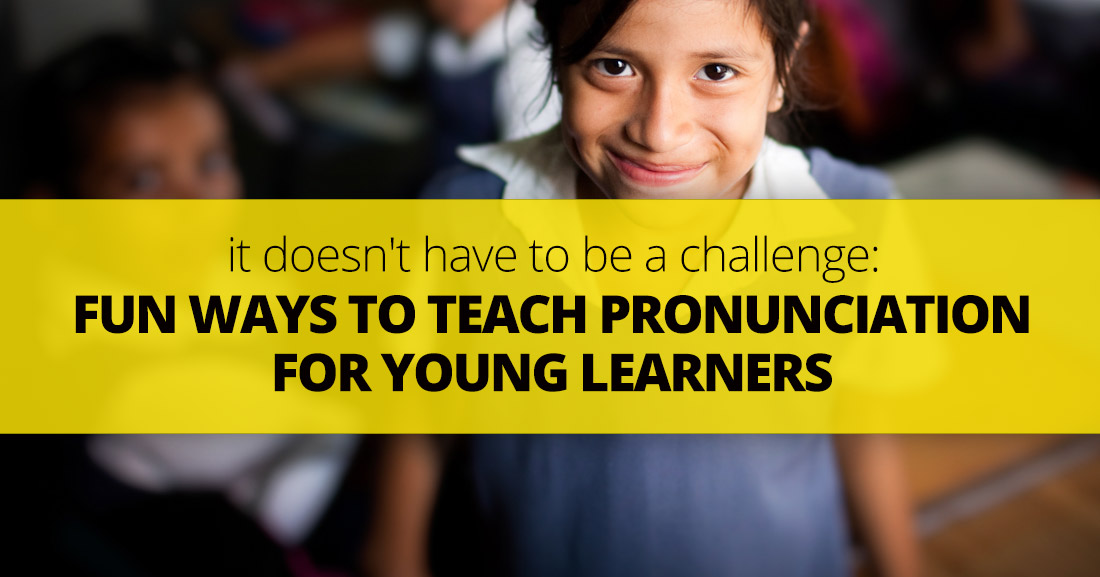Working on pronunciation with ESL students is always hard work.
Although naturally it can be tougher with some students than with others, it is often one of the biggest challenges that students go through in general. Where young learners are concerned , they are usually very aware that English feels and sounds different to their mother tongue at a very early age. It is even adorable to see how very young kids make such an effort to imitate the way their teacher says the words they are learning. As of age 8-9 they become very aware of how different things sound which makes this a great age to really start working on pronunciation. As we know, poor pronunciation affects all four skills and because of this, learning in general can become compromised.
3 Issues of Bad Pronunciation
-
1
Speaking
It is very tough for students to gain fluency if they are having a hard time producing certain sounds or getting a short phrase out of their mouth. An unfortunate consequence of this is that learners actually avoid words or grammatical structures that they have difficulty pronouncing. As a result teachers sometimes misinterpret these ‘gaps’ in production as gaps in a learner’s knowledge or understanding.
-
2
Listening Comprehension
Listening is incredibly tough for students who have trouble with pronunciation. They simply don’t recognize sounds or words that are produced causing trouble in comprehension. Also, since they have to concentrate so hard when listening they feel overwhelmed and again comprehension is affected. Often when teachers detect issues with listening the response is to work on more listening activities. However, we need to consider what is producing lack of comprehension. After all, perhaps what needs more focus is pronunciation.
-
3
Reading and Writing
Poor pronunciation can also badly affect reading and writing. Where writing is concerned, students might write where instead of were, for instance. Reading comprehension can also be affected since saying the words incorrectly can lead students to confuse words and their meaning.
Great Tips and Fun Ways to Teach Pronunciation for Young Learners
-
1
Make sure to do most if not all pronunciation exercises in your course book. Make sure to include pronunciation practice in your lesson plans. They are too important. On the other hand, if exercises that aren’t relevant to your students you don't need to spend much time on them.
-
2
Pronunciation should be integrated into normal lessons. It has to be part of the program, like learning new vocabulary, or learning a new structure. Make sure to insist on good sentence stress and rhythm.
-
3
Students need to be accurate but not but perfect. Insisting perfection will just cause students to feel frustrated and loose interest. Simply show them that good pronunciation matters. Intelligibility is the main goal for students and it can be achieved even with non-native accent.
Use a Phonemic Chart
If truth be told, many teachers shy away from using the chart. Some simply feel it could be too difficult for their students to learn. Others might believe their students will be resistant to using the symbols in class. A few teachers might not feel comfortable with it. The truth is that using the phonemic chart in pronunciation work can be more useful than teachers even imagine. This chart can be used in different ways but no matter how you choose to use it , the benefits are the same. It provides a standard from which to teach and learn pronunciation and gives teachers an effective tool for teaching pronunciation and for correcting mistakes. In addition, it enables students to better use their dictionaries. There are many fun ways to use the phonemic chart in class, too.
The Race Is On!
This activity is great to review phonemes. First, put the students in teams. On the floor place cards with different phonemes. Then stand in the front and hold out two cards, each with one word on it. The first student of each team must choose a card from the floor with the phoneme used in that word. If it is correct that group gets to keep the card with the word, if not the teacher keeps the card. Each student in each group will have an opportunity to choose a phoneme in the words the teacher is holding up. When they are done the team with the most cards wins.
Phoneme Bingo
On a bingo sheet write words in different boxes. Make sure bingo sheets are different. Put different phoneme on small individual cards in a bag. The choose from the bag and show your students the phoneme. The must look at their bingo sheets and see if they have a word containing that phoneme.
The Whisper Game
Sit your students in a circle and show one of them a symbol, also whispering it in his/her ear. That student then whispers it to the student next to him/her.The sound is passed around the class from one student to the other. If the sound is correct at the end, the students get a point, if not the teacher gets a point.
Don't make it harder that it needs to be.
Make sure to work on pronunciation with your ESL students and help them enjoy working on it. As always, when working on challenging areas of learning, be imaginative and find the best way possible to motivate them. Your students will remember it better if they are having fun.
P.S. If you enjoyed this article, please help spread it by clicking one of those sharing buttons below. And if you are interested in more, you should follow our Facebook page where we share more about creative, non-boring ways to teach English.








